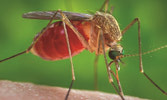---Gatineau spring mosquito management operations underway
![]()
To make the presence of flying stingers less annoying for everyone this summer, Gatineau recently began its annual biological control operations for mosquitoes. Every year, between mid-April and September, specialists with the city conduct studies of water sources in areas covered by its biological control program. The specialists apply biopesticides in the air or on the ground where larvae are found.
This year, operations will be addressing the same areas as in previous years, including the Pointe-Gatineau, Carrefour-de-l’Hopital, du Versant, Bellevue, Lac-Beauchamp, Rivière-Blanche, and Masson-Angers districts. The city is also launching a new pilot project as part of the program that involves implementing mosquito traps. Installing around 15 traps in the McLaurin Bay area between May and the end of August, the city says the pilot project serves as an alternative biological control measure in places in which using biopesticides is banned. City experts chose the McLaurin Bay as the project’s testing site since no biopesticide spraying will be conducted in the area this year. According to a press release issued by the city on April 27, the biopesticide product used in the operations is considered ecologically and biologically safe, and only targets larvae of biting bugs.
Desiring to evaluate the program’s level of social acceptability among residents, the city is planning on holding a public consultation on the matter this fall. The press release stated that the purpose of the public consultation will be surveying people to assess the acceptability of implementing a tax dedicated to biting-insect population-control operations, to evaluate the level of public satisfaction for the program in areas where it is in effect, and to measure the level of public perception and understanding of using Bacillus Thuringiensis Israelensis (BTI) as a biopesticide for bugs and its impacts.
The Québec Ministry of Sustainable Development, Environment, and Fight Against Climate Change (MELCC) and the Minstère des forêts, de la faune, et des parcs (MFFP) authorize municipal biological control measures. More information about the city’s mosquito population control operations and what residents can do to contribute is available on its website.


